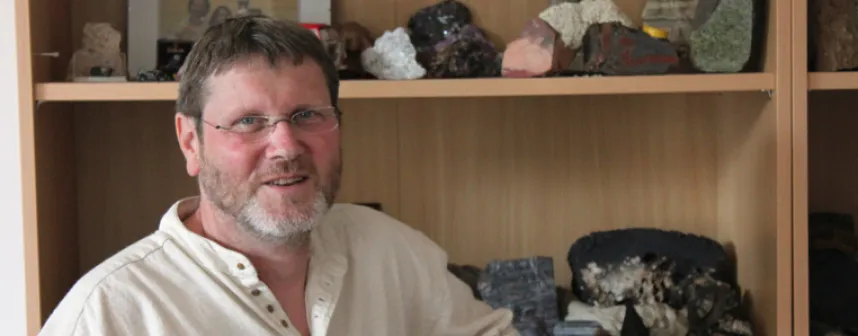A view of the whole earth
August 9, 2018
The oldest of the many stones in Prof. Dr. Michael Bau's office at Jacobs University Bremen are more than 3.8 billion years old. They formed on the bottom of an early ocean and Bau brought them back from an expedition to the west of Greenland. To geochemists, the stones are what hieroglyphics are to Egyptologists: they can read them and they serve as an archive, providing information about the environmental conditions at the time of their formation and about the chemical composition of the seawater and the atmosphere. Bau leaves no doubt that geoscience is much more than just collecting stones. "Fresh water," he says, "is the earth's most important resource." It's just harder to store on shelves.
Bau has been Professor of Geosciences at Jacobs University for 15 years. He has played a major role in establishing the department and coordinates the multi-award-winning Earth and Environmental Sciences course. His students build bridges between then and now, between environmental protection and the use of raw materials. They deal both with the environmental conditions during the planet’s early period, when the Earth system with its rocks and organisms was formed, and with the discovery of metal deposits and the effects of these metals on the environment. "Environmental protection and the supply of raw materials are inextricably linked," emphasizes Bau.
The 57-year-old is mainly involved in research into critical raw materials such as rare earths, niobium, gallium, lithium and scandium and their behavior in the environment. They are critical because they are rare, often mined in the remotest of areas in politically unstable regions, but they are also indispensable for modern key technologies such as wind and solar energy, electric mobility and lightweight materials for aircraft and vehicle construction. "Everyone should be aware that renewable energies need non-renewable metals," says Bau.
Some of these metals, such as gadolinium, are released into the environment. It comes from residues of contrast agents used in medical diagnostics and enters rivers, lakes and drinking water via treated wastewater. "In Germany, we have not found a river that does not contain the contrast agent gadolinium and we have even found it in South America and Africa," says Bau. It is not dangerous to humans, but it serves as an indicator of the existence of substances hazardous to health, which is more difficult to detect in drinking water, for example.
Bau travels for two to three months a year, getting samples for research projects in South Africa, Brazil, Morocco, the Philippines and Greenland. The stone and water samples are the be-all and end-all for a geoscientist. "We do not only work in the laboratory, but also in nature, in the field, in wind, rain, heat and cold. Any geoscientific study is only as good as the set of samples examined - and this requires careful work even under adverse conditions," stresses Bau.
He also teaches his students the right sampling techniques, but on excursions to closer destinations such as the Harz, the Eifel or Ireland. This practical training is an essential part of the course. Bau also offers courses in geology and geochemistry and supervises a number of doctoral students. Most of his former students remain loyal to science, some of them are now professors themselves and teach at renowned universities.
In January 2003, Bau started working at Jacobs University, then still known as the International University Bremen. Before that, he conducted research at the NASA Penn State Astrobiology Research Center in Pennsylvania, USA. It was the concept of an international, multicultural, English-medium, campus-based university with an interdisciplinary orientation and an intensive mentoring program that convinced him - and it still does today.
"Geoscientists deal with the whole world and must therefore be multicultural and cosmopolitan - a modern course of study like Earth and Environmental Sciences is therefore perfectly suited for Jacobs University," he says. And indeed, this course repeatedly obtains outstanding scores in university rankings. Bau has another explanation for this: "Irrespective of whether if one is a professor or part of the scientific, technical or administrative staff - all of us here at Jacobs University work with conviction and passion," he says. "It's just great to be able to work and study in this committed multicultural environment."
For more information:
https://www.jacobs-university.de/directory/mbau
http://earth.user.jacobs-university.de
https://www.jacobs-university.de/study/undergraduate/programs/earth-and-environmental-sciences
